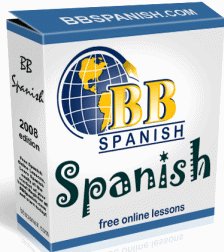
Lesson 9: Spanish Nouns
LOS SUSTANTIVOS (The Nouns)
Spanish nouns agree in gender: male and female, and in number: singular or plural with the article (el hombre, la calle, los dias, las madres, etc.).
Gender
The most common end of Spanish nouns are:
Masculino Femenino
-o -a,
-e, -d, -i,-ista, -l, -n, -r, -s, -u, -x, -z
Generally, the end -o is male and the end —a is female. The ambiguity of the other forms disappear with the article
Spanish nouns that are male:
- Nouns that denote male living beings (hombre; rey; etc.)
- Those that end in —ma derived from the Greek language (tema; clima; sistema; idioma; programa; problema; esquema; drama; etc.).
- Days of the week and months
Spanish nouns that are female:
- Nouns that denote male living beings (mujer; reina; etc.)
- Nouns that end in -cion, -sion, -tion (cancion; cuestion; pasion; etc.)
- Nouns that end in -d (exception: cesped and huesped if he is a male)
Some nouns that cause confusion:
Male:
- labios, dientes, fin de semana, pie, traje, cine, tranvia, item, album.
Female:
- flor, calle, clase, vez, mano, una, voz, letra (the “a”, “b”, etc.), foto, moto, noche, razon.
Nouns that begin with the setter a or with the form a stressed, take the article “el” due to phonological reasons, but they do not lose their gender if it is female: aula, hambre, alma, agua, etc
Number
How to form the plural:
Singular
-vowels -a/-e/-o (cara, elefante, vaso)
<![if !vml]> <![endif]>El Caballo
<![endif]>El Caballo
Plural
-s (caras, elefantes, vasos)
<![if !vml]> <![endif]><![if !vml]>
<![endif]><![if !vml]> <![endif]>Los Caballos
<![endif]>Los Caballos
With the consonants: -d, -j, -l, -m, -n, -r, -s, -y (pared, reloj, arbol, album, camion, mar, compas, rey)
The plural is formed by adding: -es (paredes, relojes, arboles, albumes, camiones, mares, compases, reyes)
Example
<![if !vml]> <![endif]>El reloj
<![endif]>El reloj
<![if !vml]> <![endif]><![if !vml]>
<![endif]><![if !vml]> <![endif]>
<![endif]>
Los relojES
With the vowels: —a/i/u (sofa, mani, ombu) the plural is: -aes/ies/ues (sofaes, manies, ombues)
With the consonant: -z (vez) the plural is: -ces (veces)
Days of the week (lunes) the plural is: (lunes)
Collective nouns (for example: gente, manada, familia, etc.) are used in the singular form.
They also form their plural in a regular form: familias, manadas, etc.
Lectura (Reading)
Maria remodelara su casa. El pintor pintara las paredes del living de color amarillo y la pared de la entrada de color blanco. Las sillas quedaran igual, pero la mesa sera nueva. Los muebles seran de estilo moderno. Toda la familia esta muy contenta. Podran elegir los colores que deseen para sus dormitorios.
Maria is going to remodel her home. The painter is going to paint the walls of the living room yellow and the entrance wall, white. The chairs are going to remain the same, but the table is going to be a new one. The furniture is going to be in modern style. The whole family is really happy. The will be able to choose the colors they want for their bedrooms.
Exercises:
1) Write the corresponding singular or plural article of the following nouns:
la casa, el pintor, las paredes, el living, el color, las sillas, la mesa, los muebles, la familia, los dormitorios, los colores.
2) Write the singular or plural as applicable of the following nouns:
Casa (house) – casas
Pintor (painter) – pintores
Paredes (walls) – pared
Color (color) – colores
Sillas (chair) – silla
Mesa (table) – mesas
Muebles (furniture) – mueble
Familia (family) – familias
Dormitorio (bedroom) — dormitorios
3) Complete with the correct article.
LA Cara – EL Pelo – EL Brazo – LA Cabeza – EL Dedo del pie – LA Mano – EL Dedo – EL Hombro – LA Cadera – EL Pecho – LA Cintura – LA Rodilla – EL Tobillo – EL Pie – LA Pierna – EL Cuello –
<![if !vml]> <![endif]>
<![endif]>
4) Complete the following sentences with the correct form of the nouns:
a. Los relojes (reloj) estan descompuestos. (The clocks aren´t working)
b. Fuimos al cerro muchas veces (vez). (We went to the mountain many times)
c. Las montanas (montana) eran muy altas. (The mountains were very high)
d. El agua (agua) estaba fria. (The water was cold)
e. Voy a clase (clase) de esqui los lunes y los miercoles (lunes, miercoles) (I go to ski classes on Mondays and Wednesdays)
f. Los arboles (arbol) tenian un color ocre. (The trees were ochre)
g. Los huespedes (huesped) se hospedaron en un hotel lujoso. (The guests stayed in a luxury hotel)
h. Muchas familias (familia) emigraron a Espana. (Many families emigrated to Spain).
i. El aula (aula) estaba llena de estudiantes. (The classroom was full of students)
5) Write two sentences using the following collective nouns: gente, familia.
La gente estaba realmente asombrada (People were really surprised)
La familia llego justo a tiempo para ver el partido de futbol. (The family arrived just on time to match the football match)
